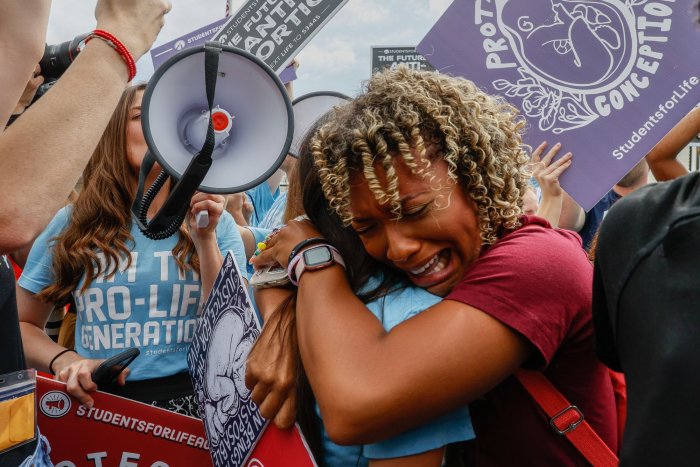Abortion opponents celebrate after the U.S. Supreme Court overturns Roe vs. Wade, ending federal abortion protection in Washington on Friday. Photo by Jemal Countess/UPI |
License Photo
June 24 (UPI) -- The conservative-majority U.S. Supreme Court on Friday handed down a decision that overturned its 1973 opinion in Roe vs. Wade, which legalized abortion nationwide.
The 6-3 decision by the court, which saw Chief Justice John Roberts side with the conservative majority, eliminates the federally protected right to abortion procedures and states looking to restrict access to the medical procedure are expected to move quickly to criminalize it.
While the ruling itself does not outlaw abortion, it pushes the decision on its legality back to individual states, many of which have enacted bans or severe restrictions.
"We hold that Roe and Casey must be overruled," Associate Justice Samuel Alito wrote in the decision, which had been expected after a draft decision was leaked weeks ago. "The Constitution makes no reference to abortion, and no such right is implicitly protected by any constitutional provision, including the one on which the defenders of Roe and Casey now chiefly rely -- the Due Process Clause of the Fourteenth Amendment."
Alito writes that any right the due process clause protects must be "'deeply rooted in this nation's history and tradition' and 'implicit in the concept of ordered liberty.'"
In returning the decision on abortion rights to individual states, Alito said the court has moved to "heed the Constitution."
The dissenting opinion referred to the history of women's rights, and that taking that originalist stand actually limits the rights of women.
"Most women in 1868 also had a foreshortened view of their rights: If most men could not then imagine giving women control over their bodies, most women could not imagine having that kind of autonomy," the three dissenting justices -- Stephen Breyer, Sonia Sotomayor and Elena Kagan -- write in the decision.
"Those responsible for the original Constitution, including the Fourteenth Amendment, did not perceive women as equals, and did not recognize women's rights. When the majority says that we must read our foundational charter as viewed at the time of ratification... it consigns women to second-class citizenship."
The decision, the dissenting justices wrote, means that states could now force a woman "to bring a pregnancy to term, even at the steepest personal and familial costs."
The Supreme Court's decision now makes the issue of abortion one for each state to decide. More progressive states like California and New York have laws protecting abortion -- while conservative states like Texas and Oklahoma have taken steps to ban the procedure.
Some states had laws-in-waiting that would ban abortions outright as soon as the Supreme Court overturned Roe vs. Wade.
The court ruled in favor of a 2018 Mississippi law that bans abortions after 15 weeks of pregnancy. The case was argued before the Supreme Court in December.
The decision was widely expected after a version of the opinion leaked almost two months ago indicated that the six conservative justices were preparing to strike down the 49-year-old law.
It's still unknown who released the draft opinion to the media -- but the court is investigating the leak, which is extremely rare for Supreme Court opinions.
The other five justices to join Alito were Clarence Thomas, who was appointed by former President George H.W. Bush, and Neil Gorsuch, Brett Kavanaugh and Amy Coney Barrett, all of whom were nominated by former President Donald Trump, and Chief Justice John Roberts, who was nominated by former President George W. Bush.
Breyer was nominated by former President Bill Clinton, Sotomayor and Kagan by former President Barack Obama.
The leak of the opinion in May set off a wave of protests by abortion-rights activists outside the Supreme Court and even some of the justices' homes. A man was arrested and charged earlier this month after he was caught near Kavanaugh's Maryland home. Police said he'd planned to kill Kavanaugh over the abortion decision.
In the case, Mississippi Attorney General Lynn Fitch asked the Supreme Court to review Roe vs. Wade as part of her office's fight to defend the state's abortion law in July. The office filed a brief saying the landmark 1973 Supreme Court ruling failed to settle "the issue of abortion once and for all."
"All it did was establish a special-rules regime for abortion jurisprudence that has left these cases out of step with other court decisions and neutral principles of law applied by the court," Fitch said.
"As a result, state legislatures, and the people they represent, have lacked clarity in passing laws to protect legitimate public interests, and artificial guideposts have stunted important public debate on how we, as a society, care for the dignity of women and their children. It is time for the court to set this right and return this political debate to the political branches of government."
The brief said the only way to reconcile the "competing interests" is to return the matter to legislators, not judges.
Mississippi's only abortion clinic, Jackson Women's Health Organization, sued the state after Bryant signed the ban into law. It made exceptions for medical emergencies and "severe fetal abnormality," but not cases of incest or rape.
A federal judge in Mississippi struck down the law in late 2018 and the 5th U.S. Circuit Court of Appeals upheld that ruling in December 2019.














